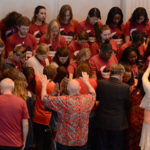We arrived Sunday morning, were welcomed into Dilli’s house, and found his entire family dressed up in Nepali dress or at least new clothes packed into the living room while the kids watched Scooby Doo. Shortly after we arrived, Grandma and the eldest couple set about lighting incense and preparing a plate of rice, money and flowers, which they sat on the coffee table.
The eldest couple and Grandma began blessing each person, beginning with the oldest and going down the line all the way to Umish. They sang in Nepali over each person, applied a Tika (a mixture of rice, yogurt and plant-based dye) on each forehead, and placed leaves or flowers behind the ears of each participant. Before we took part, we learned that the one being blessed should bow to the ones blessing; and, after being blessed, should place palms together and exchange “Namaste” with each person in the room. We took our turns, then joined the family around the table for a meal.
Dasara celebrates the defeat of demon giants by a Hindu god. The blessing, I later learned from Dilli, is for long life, happiness, and wealth.
As Christian missionaries, we have to ask a few questions. To what level do we participate in such rituals, if at all? Do we speak out against idolatry at the first mention of foreign gods, or do we learn about their customs and worldviews before we tell them they are wrong? Do we simply hold our tongue in order to be open-minded and tolerant, or do we hold our tongue in order for strategic purposes, awaiting the right time to share the gospel? Do we verbalize our objections at first opportunity for fear of being syncretistic? Or do we critique our Hindu brother because we love him and don’t want him stuck in idolatry and false ideology?
Jude 15 describes judgement of the ungodly as the Lord judges. In the same way, we should place judgement on that which goes against God. However, maybe there is a time and place for this. For missiological reasons, as well as in accordance with 1 Corinthians 9 and Romans 14, maybe we should first “become like” those to whom we are trying to reach and “stop passing judgement,” at least until we actually understand our friends.
We are still struggling through these questions at Segue, but are striving to live like Christ and share the good news as best we can.
Matthew Johnston, a student at Wayland Baptist University, is serving as a Go Now missionary with Segue, a ministry to refugees.














We seek to connect God’s story and God’s people around the world. To learn more about God’s story, click here.
Send comments and feedback to Eric Black, our editor. For comments to be published, please specify “letter to the editor.” Maximum length for publication is 300 words.